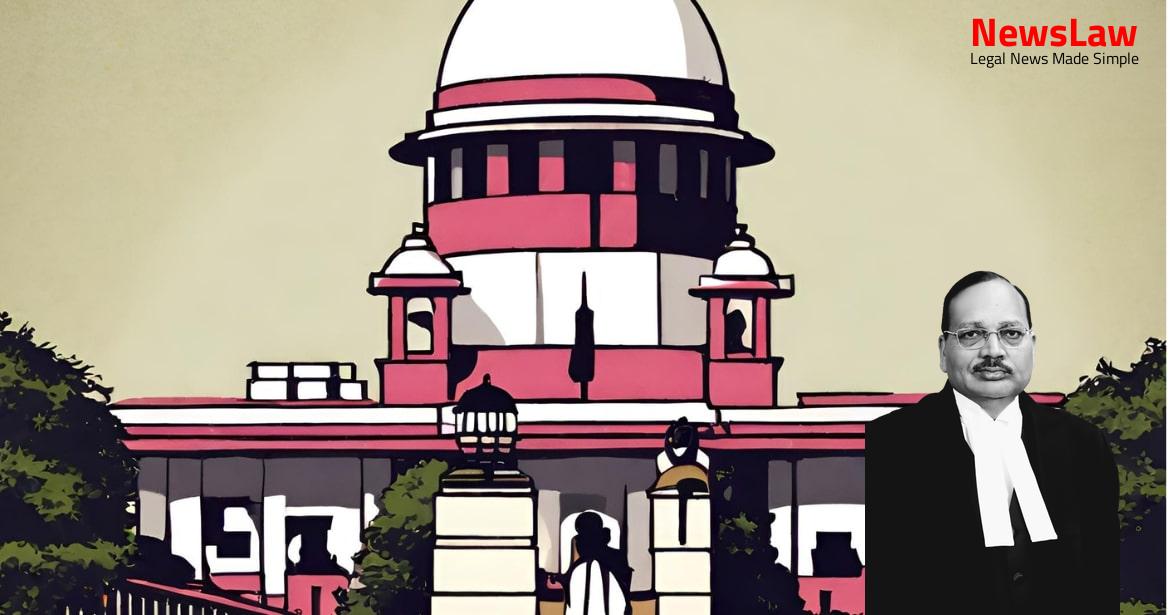The court’s meticulous examination of the statutory framework in Export-Oriented Unit (EOU) cases sheds light on the nuances of duty exemptions and compliance with the EXIM Policy. Dive into the complexities of statutory interpretation and the intersection of various legal provisions in ensuring adherence to legislative intent.
Facts
- UFAC, an EOU, was involved in the conversion of raw materials supplied by TISCO into Silicon Manganese.
- The Commissioner found that the job work done by UFAC was governed by para 9.17(b) of the EXIM Policy, permitting job work for DTA units only for exporting finished goods directly.
- Several show cause notices were issued to UFAC regarding the clearance of Silicon Manganese in DTA and non-payment of central excise duty.
- CESTAT reversed the demand orders against UFAC, stating that the job work sector was not covered by certain Circulars, and since there was no sale but a return of goods after job work, it did not violate EXIM Policy.
- The show cause notices also questioned UFAC’s job-work activities in sectors not covered by Circulars, leading to a demand confirmation of over Rs.11 crore by the Commissioner.
- UFAC’s written replies argued that there were no violations of Central Excise Law in the show cause notices.
- The audit by the Central Intelligence Unit led to allegations of EOU involvement in job-work activity for TISCO.
- UFAC cleared Silicon Manganese for export and in DTA, paying excise duty, but faced issues for not exporting finished goods after job work.
- Appeals were filed by UFAC and its Chairman against the demand orders, with conflicting findings by the Commissioner and CESTAT on EXIM Policy violations.
- Penalty of Rs.50 lakhs imposed on UFAC.
- Personal penalty of Rs.5 lakh imposed on the Chairman of UFAC.
- Goods valued at Rs.32,31,30,000 were liable for confiscation.
- Redemption fine of Rs.50 lakhs imposed in lieu of confiscation.
- Two more similar orders confirming demand were passed on subsequent show cause notices.
Also Read: Legal Analysis on Arbitration Petition Limitation Period
Arguments
- Revenue argues that duty on goods brought to India by 100% EOU should be levied as per Customs Act duties on similar imported goods.
- Counsel for UFAC argues that their transactions were permitted under EXIM Policy paragraph 9.9(b) by Development Commissioner.
- Permission for job work with EOU/EPZ units expanded to all sectors in Circular dated 22.5.2000.
- Authority did not consider the clarification by Development Commissioner regarding UFAC’s activities under EXIM Policy.
- UFAC’s transaction with TISCO does not involve transfer of property in goods, hence not considered a sale under Sale of Goods Act.
- Revenue argues that with the amendment in law from 11.5.2001, the Exemption Notification lost statutory force.
- Shri Patil submits that UFAC is entitled to the benefits of the Exemption Notification.
- Shri Patil argues that the ‘sale’ and ‘purchase’ should be construed with reference to the definitions under the Central Excise Act and not the Sale of Goods Act, 1930.
- Shri K. Radhakrishnan, representing the Revenue, argues that there is no transfer of property in goods in the transaction between UFAC and TISCO, therefore, it cannot be termed as a ‘sale’ under paragraph 9.9 (b) of the EXIM Policy. He relies on the provisions of the Sale of Goods Act, 1930.
Also Read: Analysis of High Courts’ Jurisdiction and Court Orders Under Article 142
Analysis
- The court has emphasized on the importance of interpreting statutes based on the literal language used by the legislature.
- The consideration is on the interpretation of the proviso to sub-section (1) of Section 3 of the Central Excise Act, 1944, regarding the liability of an EOU to pay duty on goods brought to a DTA.
- The analysis involves the interaction between Section 3, Section 5A of the Central Excise Act, and Exemption Notifications, highlighting the conditions for duty exemption for EOUs.
- The court references specific provisions of the EXIM Policy, Circulars, and Notifications to determine the entitlement of UFAC to carry out job-work for TISCO and the duty exemption under the Exemption Notification of 1997.
- Various Circulars issued by the Board and clarifications from the Development Commissioner are considered in the interpretation of the EOU scheme and duty implications.
- The judgment focuses on reconciling the legislative intent behind different provisions to ensure a harmonious construction and application of the law.
- The narrow and wide interpretations of terms like ‘sale’ and ‘allowed to be sold in India’ are discussed within the context of the EOU scheme and duty exemptions.
- The analysis also addresses the requirement of approval for specific activities under the EOU scheme and clarifies the permissions needed for various transactions like job-work and DTA sales.
- Inconsistencies in statutory provisions are examined, emphasizing the need to avoid rendering any provision otiose or redundant.
- Overall, the analysis aims to interpret the statutory framework in a manner that upholds legislative intent and ensures the proper application of laws related to EOUs, duty exemptions, and job-work permissions.
- Section 5A of the Central Excise Act allows the Central Government to grant exemptions from excise duty for certain goods in the public interest.
- The exemption may be absolute or subject to specified conditions, and it applies to excisable goods of a specified description.
- The proviso in Section 5A states that no exemption will apply to goods produced in a free trade zone, special economic zone, or by a hundred percent export-oriented undertaking if brought to any other place in India.
- Section 2(h) of the Act defines ‘sale’ and ‘purchase’ in relation to the transfer of possession of goods in the course of trade or business.
- When goods are transferred in such a manner for processing or conversion, it constitutes a sale under the Central Excise Act.
- The Act levies excise duty as the Central Value Added Tax on all excisable goods produced or manufactured in India, except those produced in special economic zones.
- The duty for goods produced by a hundred percent export-oriented undertaking and brought to India would be equivalent to customs duties on similar imported goods.
- The government can grant exemptions for goods sold in India by export-oriented undertakings under certain conditions.
- The Exemption Notification allows EOUs to be exempted from excess duties on goods sold in India as per specified policies.
- The Notification specifies that goods produced by EOUs and sold in India under specific policies are exempted from excess excise duties as mentioned in Section 3 of the Act.
- Section 5A allows the government to exempt excisable goods from duty if necessary in the public interest, either entirely or subject to specified conditions.
- The decision in this case involves determining the applicability of exemptions and duties on goods produced by an EOU and sold in India.
- Legal maxim ‘a verbis legis non est recedendum’ (from the words of law, there must be no departure) must be adhered to.
- Provision in legislation should not be purposeless and must have a clear purpose.
- Judgments in various cases have highlighted the importance of interpreting statutes within their intended scope and purpose.
- Debonding and permission to sell in India are distinct concepts and should not be confused.
- The definition and restrictions of one statute should not be mechanically applied to another with a different purpose.
- Provisions in the Prevention of Food Adulteration Act are specific to ensuring quality control and do not relate to excise duty classification.
- Court should not assume legislative mistakes and should interpret statutes based on plain and unambiguous language.
- Importance of not adding or subtracting words from a statute based on personal views.
- Interpretation must avoid rendering any words redundant or purposeless.
- Sales made by UFAC to TISCO are within permissible limits and with permission of Development Commissioner.
- The view of the Court in Sarla Performance Fibers Limited and Siv Industries Ltd. are similar and not applicable to the appellant’s case.
- CESTAT did not commit any error in reversing the orders-in-original passed by the Commissioner.
Also Read: Electoral Malpractices in Mayor Election
Decision
- The appeals are dismissed
- Reasons for dismissal were provided
- The decision is final
Case Title: COMMR.OF CENTRAL EXCISE,NAGPUR Vs. M/S UNIVERSAL FERRO & ALLIED CHEM.LD.&AN (2020 INSC 285)
Case Number: C.A. No.-000848-000852 / 2009



